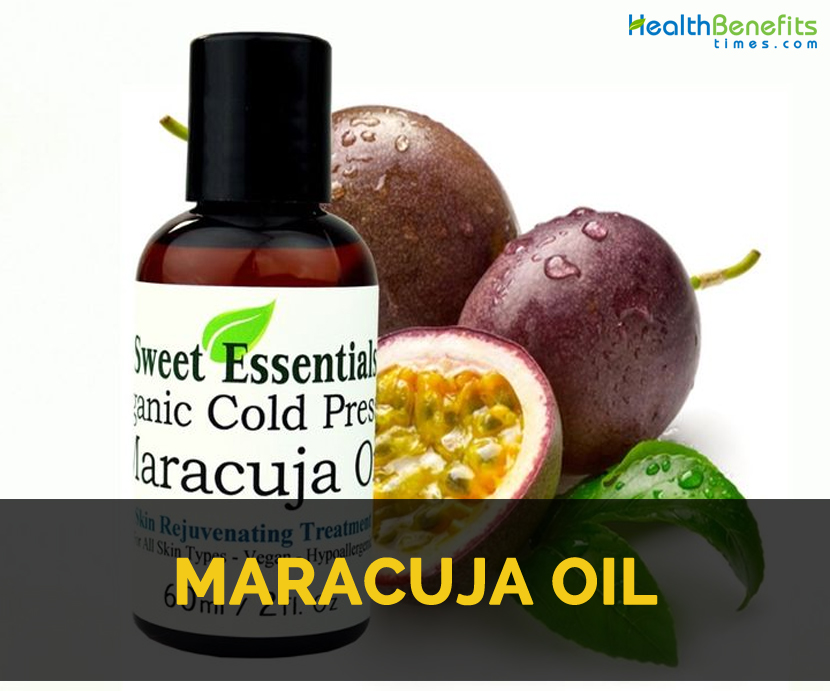History
Maracuja – Passion fruits are cultivated in Middle East, Central America, South Pacific, Mediterranean and other subtropical locations. Native Americans used the flower topically to treat boils and they drank infusions to enhance the liver health and used as a blood tonic. It was used to treat nervousness and insomnia by Aztecs of Mexico. The plant was used in European medicine when taken back to Europe.
Health Benefits of Maracuja oil
Maracuja oil possesses various health benefits which are discussed below:
- Treats dry skin
This oil is an emollient that hydrates the skin. It is better to do a patch test before applying Maracuja oil to the skin. Rub few drops of oil to the skin. It does not make skin oily. It could be diluted with carrier oil such as olive oil or coconut oil.
- Cure itching
Maracuja oil helps to cure itching. Apply few drops of oil to the itching area. Do not use it in case of skin problems such as psoriasis and eczema. It effectively treats insect bites.
- Prevent sun damage
The exposure to sunlight causes sun damage that helps to speed up ageing process. Blemishes, sun spots and wrinkles are the signs of ageing. Directly apply Maracuja oil to the areas. It aids the skin from sun damage.
- Soothe muscles
Massage with Maracuja oil to soothe sore as well as tired muscles. It provides relief from muscle cramps. This oil has high content of Omega-6 fatty acids which helps to lower inflammation.
- Relieve anxiety
It possesses anxiety reducing effects. Inhale Maracuja oil for about 20 minutes. It has earthy and woody smell. It provides relief from anxiety.
- Treat insomnia
Put few drops of Maracuja oil over the pillow. This helps the people to get asleep. The aroma could also be inhaled. Lay in the warm water by adding 10 to 20 drops of Maracuja oil. It helps to provide a relaxing bath. It has sleep inducing effect that assist one to get asleep.
Traditional uses
- It helps to promote sleep and relaxation in anxiety patients.
- It is a treatment for eczema and psoriasis.
- It prevents the sun damage and lowers muscle inflammation.
- It heals cracked and dry skin.
- It also lowers the appearance of wrinkles.
- It prevents the toxic build up and promotes skin complexion.
- It is helpful for the damaged skin such as wounds, burns, scars and cuts.
- It promotes hair growth, increase vitality and repair split ends.
- It is used in massage to ease muscular aches as well as swelling.
- It helps to ease muscle pain and arthritis joints.
Precautions
- Its topical use might result in skin irritation.
- Allergic people should avoid its use.
- Use it after consulting the health practitioner.
- Do not ingest it even at low concentrations because it is toxic.
- It could cause acne breakouts.
Maracuja oil facts
| Maracuja oil facts and uses Quick Facts | |
|---|---|
| Name: | Maracuja oil facts and uses |
| Origin | Passion fruits are cultivated in Middle East, Central America, South Pacific, Mediterranean and other subtropical locations. |
| Health benefits | Treats dry skin, Cure itching, Prevent sun damage, Soothe muscles, Relieve anxiety |
| Name | Maracuja oil facts and uses |
|---|---|
| Scientific Name of Maracuja plant | Passiflora edulis |
| Native | Passion fruits (Maracuja) are cultivated in Middle East, Central America, South Pacific, Mediterranean and other subtropical locations. |
| Common/English Name | Passionfruit, Passion fruit, Maracuja |
| Name in Other Languages of Passion fruit | Hawaiian: lilikoʻi ; Arabic: fakihat aleashq (فاكهة العشق); Chinese: Xī fān lián guǒ (西番莲果); Brazilian Portuguese: maracujá; Czech: mučenka tropické ovoce; Croatian: gospodinova krunica; Danish: passionsfrugt; European Spanish: maracuyá; Dutch: passievrucht; Finnish: passiohedelmä; German: Passionsfrucht Passionsfrüchte; French: fruit de la passion; Greek: froúto tou páthous (φρούτο του πάθους); Japanese: Passhonfurūtsu (パッションフルーツ); Italian: frutto della passion; Korean: sigyepul-ui yeolmae (시계풀의 열매); Polish: owoc męczennicy; Norwegian: pasjonsfrukt; Portuguese: maracujá; Russian: marakuyya (маракуйя); Romanian: fructul pasiunii fructele pasiunii; Thai: P̄hl mị̂ pelụ̄xk k̄hæ̆ng mī rs̄ perī̂yw læa mī mel̆d mākmāy (ผลไม้เปลือกแข็งมีรสเปรี้ยวและมีเมล็ดมากมาย); Spanish: maracuyá; Swedish: passionsfrukt; Ukrainian: marakuyya (маракуйя); Turkish: çarkıfelek meyvası; Vietnamese: quả chanh leo; |
References:
https://www.amazon.com/MARACUJA-Natural-Undiluted-Botanical-Beauty/dp/B00B0N4ID6
http://oilhealthbenefits.com/maracuja-oil/


